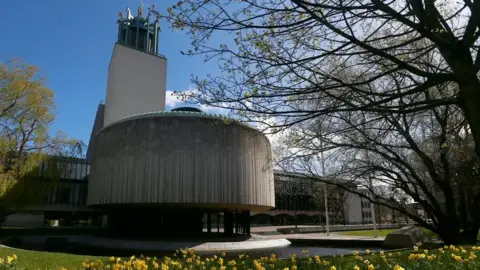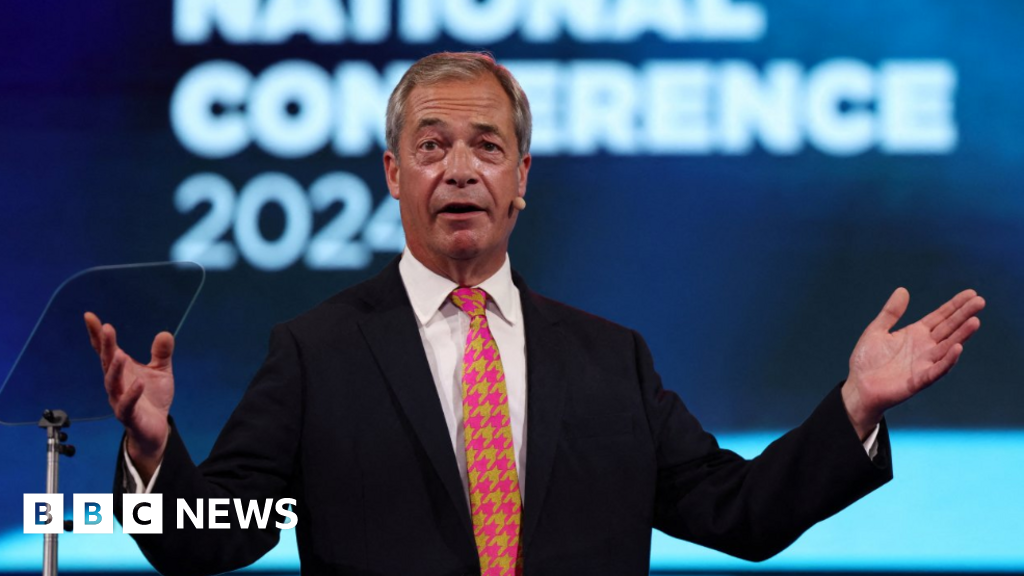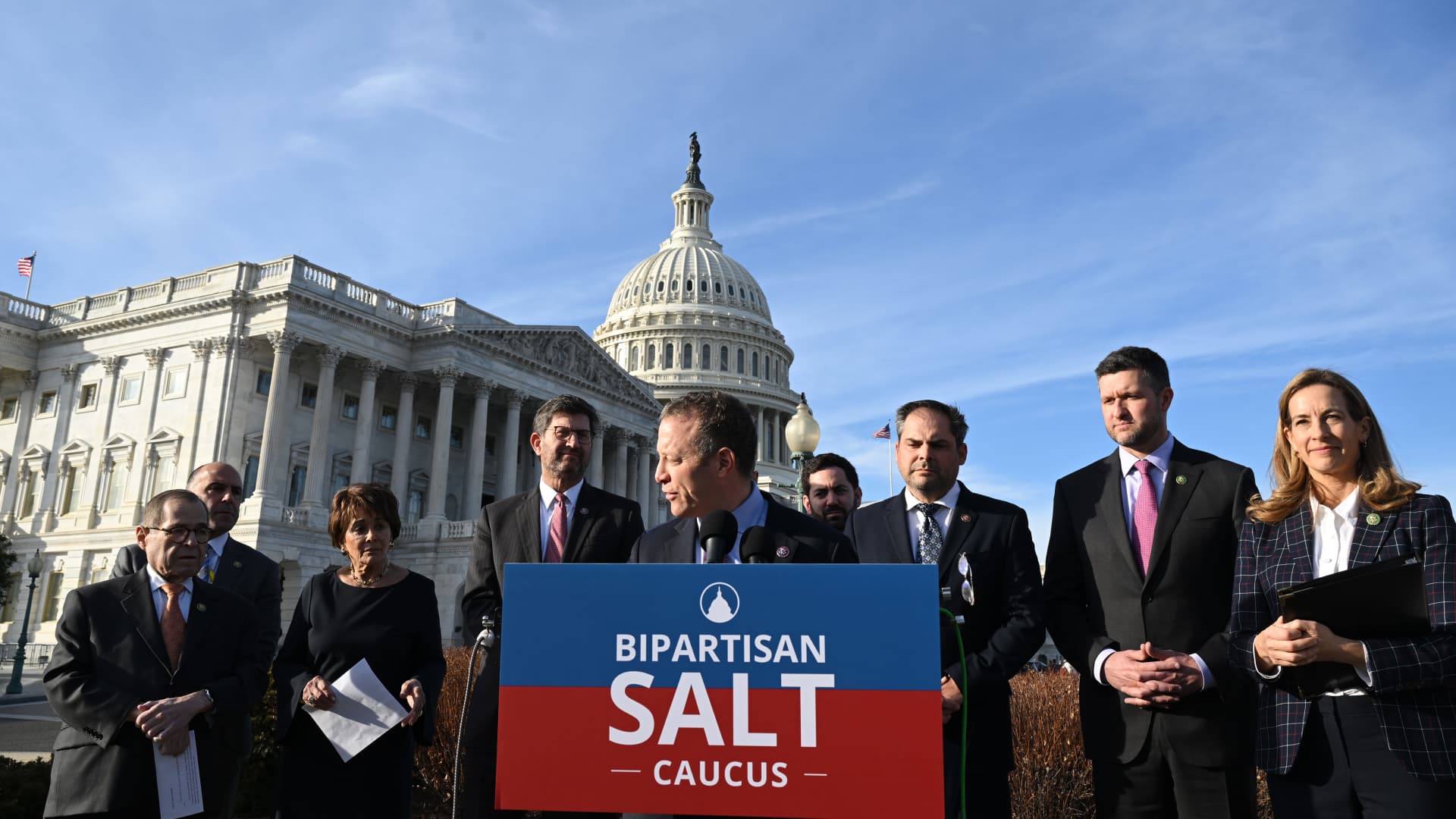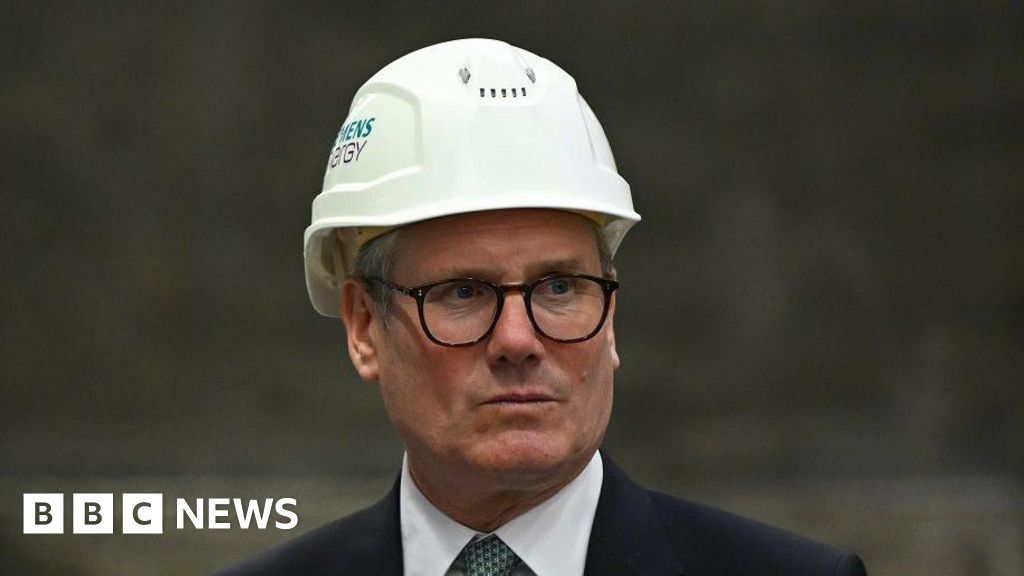Politics
Russian prisoner freed in swap urges UK not to let hundreds more ‘die off’ | Russia
Vladimir Kara-Murza, a Russian dissident freed in the biggest prisoner swap since the cold war, has appealed to Keir Starmer during a meeting in Downing Street to not let hundreds of political prisoners in Russia and Belarus quietly “die off”.
Kara-Murza, who was released last month two years into a 25-year sentence after speaking out against the war in Ukraine, said he had told the prime minister on Friday that organising further such swaps was a matter of “life and death”.
The 43-year-old Russian politician, who has British citizenship after moving to England as a child, was one of 16 westerners and Russians, including five German nationals, exchanged last month for 10 Russian nationals, including two minors.
The deal marked the first time in 40 years that Russian political prisoners had been released by the Kremlin as part of a swap.
The White House said that Alexei Navalny, who died in a Russian prison camp last year, had been due to be part of the exchange.
Kara-Murza, a father of three, who survived two poisoning attempts in 2015 and 2017, said he had made the case for further swaps to Starmer and in all his recent meetings with senior politicians, including the US president, Joe Biden, and the German chancellor, Olaf Scholz.
The deal under which he had been released had been an “unequal” arrangement, he said, involving murderers, spies and hackers being swapped for people who had committed no crimes, but there was no alternative, Kara-Murza insisted.
“There can be nothing more valuable, more important for democracy, than human life,” he said. “I know what it’s like just to wake up every morning in a cell two by three metres, four walls, a small window covered by bars, just essentially walking in a small circle all day, staring at walls. You have no one to speak to, nothing to do, no one to go to and this is how the rest of your life is going to continue … This is not just a question of unjust imprisonment, although that in itself would be unacceptable … it’s a question, very literally, of life or death.”
Among the cases referenced by Kara-Murza were Alexei Gorinov, 63, an elected official of Moscow’s Krasnoselsky district council, who was the first person in Russia to be arrested for his opposition to the war in Ukraine, and Maria Ponomarenko, 46, a journalist from Siberia imprisoned for accusing the Russian air force of bombing a theatre in the Ukrainian city of Mariupol, who is on hunger strike.
“We need to be advocating, to be getting them out,” Kara-Murza said, adding that the argument that such deals encouraged Kremlin to take hostages was “fallacious” as Putin was going to lock up his opponents anyway.
Kara-Murza, who had been held in a high security prison in Siberia, said he had also talked to Starmer about the need for a strategic plan for Russia after Vladimir Putin.
Authoritarian regimes appeared stable from the outside but change could happen in an instant, he said, and it was vital not to repeat the mistakes of the 1990s after the collapse of the Soviet Union.
There would need to be a reckoning with those who committed crimes during Putin’s 25 years in power and a plan to reintegrate Russia into the rules-based order, he said.
“One of the things that has occupied my mind for a long time, but especially these past few weeks that I’ve been out of prison, is that we have no right to miss the next opportunity for change in Russia,” he said.
Politics
The Guardian view on Labour party conference: continuity or real change? It’s time to choose | Editorial
Sir Keir Starmer has been prime minister for less than three months, yet Labour begins its annual conference this weekend already weighed down by incumbency. Rows over gifts from wealthy donors and tickets to football games as well as squabbling about his chief of staff’s pay are feeding into public disquiet. These come when the burden of government in difficult economic circumstances and in an age of low public trust would have shortened any political honeymoon period. But Downing Street also set out with the explicit objective of dampening expectations of how soon change might come. That mission has been accomplished with a needless surplus of gloom.
Sir Keir’s urgent task in Liverpool is to recalibrate the mood with a sense of optimism and purpose. He needs to give the country reasons to be glad of a Labour government in ways that go beyond relief at no longer being ruled by Tories. New governments often come to power blaming the last. Sir Keir has given the nation an unvarnished account of the dismal legacy he has inherited. That bleak audit covers a record of political and financial maladministration.
Conservative ministers, driven by ideological fanaticism and self-serving cynicism, squandered energy and resources on ill-conceived, unworkable policies, while starving public services of vital resources. Sir Keir has a difficult job because the country is in a terrible state. Putting things right will take time. But that morose message has been soured by a performance of fiscal discipline, delivered without a hint of uplifting accompaniment.
The prime minister says things will get worse before they get better. The chancellor, citing “black holes” in the budget, withdraws winter fuel payments for all but the poorest pensioners and pledges more pain to come. Rachel Reeves’ argument is that government departments would outspend budgets by £22bn more than previously disclosed and that cuts were needed to compensate. This is a self-imposed restriction that stems from ill-advised fiscal rules. The force of that constraint, and the zeal with which it is applied as austerity across Whitehall, is also a matter of political choice.
Downing Street strategists argue that adherence to Tory spending limits was a non-negotiable condition of persuading the public that Labour could be trusted on the economy. Maybe so, maybe not. There is no way to test the counterfactual scenario, where Ms Reeves fought the election with a wider range of tax-raising options still open. However, the decision to lean into unpopularity so hard, so fast and without a countervailing narrative of hope looks like poor strategic judgment.
Labour’s election manifesto contained plenty of reasons to expect a substantial departure from a grim status quo. A marked progressive shift was promised in the areas of workers’ rights, a robust commitment to net zero, improved relations with the rest of Europe and, perhaps most significantly, readiness to embrace a more interventionist model of economic management, including public ownership of utilities.
The Starmerite script contains rather too much fiscal conservatism, but the hope is that there is a social democratic framework at its core. It expresses the opposite of the Tory conviction that government’s main function is to facilitate market supremacy and then get out of the way. Many of the activists and MPs gathering in Liverpool feel unsure which of the two strands – cringing continuity or bold departure – will dominate. Sir Keir’s task is to answer in terms that give hope of meaningful change to come.
Politics
Newcastle council leader Nick Kemp resigns following bullying row

 BBC
BBCA council leader has resigned after a bullying accusation was made against him.
On Tuesday it was revealed the Labour leader of Newcastle City Council, Nick Kemp, who is currently on sick leave, was the subject of a complaint made by director of investment and growth Michelle Percy.
In an email to his colleagues, Kemp wrote that he “strenuously” refuted any allegations of bullying and said that recent events had “had a significant and detrimental effect on me and my family”.
He will step down with immediate effect as council leader and be replaced on an interim basis by his deputy Karen Kilgour, who has assumed his duties for the past week.
Kemp wrote to Labour colleagues to inform them of his resignation.
In that email, a copy of which has been seen by the Local Democracy Reporting Service, Kemp said that he no longer felt “able to operate in good faith in the position of leader of Labour Group and of Newcastle City Council”.
He also claimed that he had fallen victim to “efforts of others to deliberately discredit and undermine my work”.
New leader
Kemp has been a prominent figure in city politics for many years, having served as a councillor for Byker since 2002.
The Labour group, which has run the city council since 2011, is expected to elect a new leader over the coming weeks, although details of how that contest will proceed have not yet been announced.
A new leader can only be formally appointed at a future meeting of the full council, the next of which is scheduled for 2 October.
Kemp will continue to sit as a city councillor and said he planned to return to representing the residents of Byker once his health had improved.

Councillor Colin Ferguson, the leader of the official Liberal Democrat opposition in the council, said Kemp had done the “right thing” by stepping aside.
Ferguson added: “But his statement makes clear that tensions will remain in the Labour Group that must urgently be addressed for the sake of Newcastle residents, who risk being badly let down by Labour infighting.”
He reiterated his party’s calls for an independent inquiry into the political culture at the Civic Centre.
“Picking a new leader cannot be an opportunity for Labour to brush the culture under the carpet that led the city to this point,” Ferguson added.
Politics
Keir Starmer and top Labour colleagues to stop taking clothes gifts from donors | Labour
Keir Starmer and his top team will no longer accept free gifts of clothes from Labour donors, as it emerged that Rachel Reeves and Angela Rayner also received donations for work outfits.
After the row over the Labour peer Waheed Alli funding Starmer’s work wardrobe, the prime minister is understood to have decided he will not take donations to pay for clothes in future.
Lord Alli had given him £2,435 worth of glasses and £16,200 worth of work clothing, as well as a stay in a £18m penthouse luxury apartment. Starmer may have broken parliamentary rules in failing to declare clothes bought for his wife by Alli within 28 days of receiving them.
The Guardian can also reveal that Rayner, the deputy prime minister, was given a donation for work clothing from Alli in June. This was declared as a donation in kind from the peer worth £3,550, without saying it was for outfits. She is understood to have contacted the registrar of interests to give a fuller description of the donation.
Reeves has accepted a donation of £7,500 from a donor, Juliet Rosenfeld, since the beginning of last year, which was used to pay for clothing, but it did not amount to a donation in kind.
It is understand that Rayner and Reeves have also decided not to take any future donations of this kind for clothing.
The row over donations from Alli has caused a headache for Starmer after he pledged to run a government of high standards.
The prime minister had taken a defiant line in insisting he had complied with all rules over the declaration of more than £100,000 in free tickets, mostly to football matches, and gifts from Alli.
His decision to no longer accept free clothes comes after pressure on him from several Labour figures.
John McDonnell, the former Labour shadow chancellor, said on Friday that early Labour leaders would have been surprised to see Starmer being “expensively clothed by rich sponsors”.
McDonnell, who had the whip suspended for refusing to vote to cut winter fuel payment, said that when Keir Hardie was elected as the first Labour MP, he went to parliament in his working man’s tweed suit.
He said Hardie was not “expensively clothed by rich sponsors because as a matter of principle he refused to ape the Tories and Liberals in their expensive frock coats and silk top hats”.
“The early leaders of the Labour party must be spinning in their graves at the behaviour of some holding positions in the leading echelons of the Labour party today,” McDonnell added.
after newsletter promotion
Writing for the Guardian, McDonnell also hit out at the “poor political judgment and the failure to control the self-serving arrogance of the heavies that now control much of the party machine, including the leader’s office”.
McDonnell, who served under Jeremy Corbyn’s leadership, said previous Labour leaders would have turned their minds to implementing socialist policies rather than bickering over their own pay.
Harriet Harman, the former interim Labour leader, had also suggested Starmer should admit accepting the freebies was a mistake instead of trying to justify it.
The Labour veteran told a Sky News podcast: “You can either double down on it and try and justify it or you can just say it was probably a misstep, if I had my time again I wouldn’t do it and therefore I’m going to auction for charity or something.”
Diane Abbott, the former shadow home secretary, who had the Labour whip returned earlier this year, said on Friday: “I don’t always agree with Harriet Harman but she is right on this.”
Meanwhile, Stephen Flynn, the SNP Westminster Leader, said Starmer had shown “shockingly bad judgment” by taking more than £100,000 of freebies while “imposing austerity cuts on the rest of us”.
The furore over the freebies has added to tensions in Labour, which was also struck by a row about a salary of £170,000 given to Starmer’s chief of staff, Sue Gray. Junior advisers have been furious that she is being paid more than the prime minister when their salaries have been cut.
Starmer has defended Gray and also sought to downplay his freebies, saying everything has been declared in line with the rules of parliament.
Overall, Starmer has accepted more than £100,000 in free tickets to football matches, concerts and gifts – more than any other MP in the last parliament, and any other major party leader.
The prime minister has been facing questions over the potential conflict of interest created by accepting so many free tickets from Premier League clubs when the industry is lobbying against his plans for a football regulator.
One person involved in the formation of the regulator said there had been a huge amount of attempted lobbying by football clubs towards politicians and officials as they sought to water down the regulation.
Politics
Bigots not welcome in Reform UK, says leader Nigel Farage

Nigel Farage has said “bigots” and “extremists” are not welcome in Reform UK, as he seeks to “professionalise” the party after its election success.
Addressing its annual conference in Birmingham, the Reform UK leader said the party was “coming of age” after winning its first MPs in July.
But he conceded the party had not been “professional enough” to properly vet candidates, following a series of controversies over their past comments.
He added that the party represented the “silent majority” and could have won more seats, but that “amateurism let us down”.
Among proposed changes to make the party more professional, he said the party would be vetting candidates “rigorously” for all future elections.
He added that they would also seek to emulate the Liberal Democrats by aiming to win more seats on local councils to bolster its national electoral chances.
Politics
Trump’s promise to repeal SALT caps revives the fight on Capitol Hill

U.S. Representative Josh Gottheimer (D-NJ) speaks during a press conference about the SALT Caucus outside the United States Capitol on Wednesday February 08, 2023 in Washington, DC.
Matt McClain | The Washington Post | Getty Images
House lawmakers are using former President Donald Trump’s own words as leverage to pressure their colleagues into preserving the original state and local tax deduction, with a fight set to take shape next year.
The SALT deduction allows tax payers to deduct up to $10,000 of property, sales or income taxes that have already been paid to state and local governments. Historically, most of the tax payers who claim the deduction reside in high tax states such as New York, Connecticut, New Jersey and California.
But the cap on SALT became law when Trump was president and after he signed his $1.5 trillion tax bill in 2017, using the new version of the deduction as a pay for method. There was no cap on SALT prior to the Trump tax bill.
House lawmakers are now strategizing how to maintain what could be an unlimited SALT tax deduction in the next Congress, as the SALT cap provision from the Trump tax bill is set to expire on Dec. 31, 2025.
If Trump becomes president again, and Republicans have a majority in both the House and Senate, some House Republicans are pushing their party’s leadership to look at alternative payment methods for Trump’s tax plan, which includes cutting the corporate tax rate from 21% to 15%, according to Rep. Andrew Garbarino, R-N.Y.
Some of those recent conversations have featured Trump’s new stance on bringing back the full SALT deduction, despite his bill being the cause for the $10,000 cap.
Garbarino said he, along with Reps. Anthony D’Esposito, R-N.Y and Nick LaLota, R-N.Y., met with House Ways & Means Committee chairman Jason Smith, R-Mo., as recently as Tuesday on Capitol Hill about the need to restore the full SALT deduction.
During the meeting, the three New York Republicans pointed to Trump’s promise in a social media post to “get SALT back” if he were to become president as a way to encourage Smith to stay away from making any major alterations to the SALT deduction once it expires late next year. House Ways & Means is responsible for helping write and pass tax legislation.
“He [Trump] wants it back,” Garbarino told CNBC in an interview about how they made their recent pitch to Smith. The House Ways & Means chair “said ‘look guys, we are looking at all [pay for] options,’” Garbarino said.
Rep. Young Kim, R-Calif., told CNBC in a statement that the SALT cap is “hurting” her constituents and said Trump’s most recent take on SALT shows he’s listened to “Americans across the country hurting from the SALT cap.”
“We’ll be sure to have a seat at the table during discussions for the 2025 tax package,” Kim said, pointing to lawmakers in SALT reliant states who also want to maintain the original deduction next Congress.
Garbarino said he estimates there are at least a dozen House Republicans who won’t support a tax bill with a SALT cap at $10,000 and, at a minimum, will fight for the cap to be at a much higher level.
Some House Democrats have their own plans to bring back and keep the standard SALT deduction after the cap expires, according to Rep. Josh Gottheimer, D-N.J.
The New Jersey House lawmaker said in an interview with CNBC he wants to see the SALT cap expire in 2025 and if Democrats and Republicans from states which rely on the full SALT deduction prove to be critical votes in the House, they’ll stand in the way of legislation that maintains the cap.
“I would just say if you have a five seat Democratic majority, we will have enough people from SALT states to put the full deduction back in place and lower taxes for middle class families,” said Gottheimer. “It will be a battle.”
Politics
Live and let fly: James Bond helicopter firm awaits UK decision on £1bn deal | Aerospace industry
The Merlin helicopter sitting on a factory floor in Yeovil is a familiar sight to James Bond aficionados: it featured in the climactic shootout of the 2012 film, Skyfall.
Workers at the Somerset factory are upgrading the aircraft for the Canadian air force, a lucrative source of income for its owner, Italian state-backed weapons maker Leonardo.
But Leonardo has its eyes on a bigger prize for Yeovil: after a drawn-out process, it has emerged as the single bidder for a £1bn contract to build new medium-sized helicopters to replace the Pumas used for decades by the Royal Air Force in conflicts around the world.
Yet with Labour in the UK carrying out a strategic defence review, some in the industry believe the helicopter purchase could be scrapped altogether by a government that has stressed the gloomy state of the public finances.
What happens next matters hugely for Britain’s last remaining helicopter factory, the Somerset market town of Yeovil, and Britain’s wider defence industry. In a local population of about 50,000 people – with several areas in the 20% most deprived wards in England – Leonardo employs 3,300, many of them at higher pay than the surrounding area.
The town’s history is inseparable from the factory. The first aircraft, a seaplane, left the Westland aircraft works on 1 January 1916 on a horse and cart, according to Leonardo. During the second world war the site – which still retains some overgrown pillboxes – made the Seafire, the marine version of the famous Spitfire, before switching to helicopters. Westland became a household name in the 1980s when a row over its future nearly brought down the government of Margaret Thatcher.
Leonardo insists the MoD purchase is not at risk, despite rivals Airbus and Sikorsky quitting the competition last month. Clive Higgins, the chief executive of Leonardo’s UK arm, said that “we absolutely need a medium-lift platform” and that he was confident that the company can meet specifications that rivals thought were too testing.
Leonardo, like the defence industry as a whole, has benefited from the huge rise in military spending prompted by Russia’s full-scale invasion of Ukraine. The Italian company’s share price has more than tripled since the start of 2022, valuing it at more than €12bn (£10bn).
The invasion, other conflicts such as the Middle East crisis, and the perceived threat of Chinese aggression have contributed towards a consensus among Nato allies that more military spending is required. Labour under Keir Starmer and defence secretary John Healey are on board.
Previous Labour leader Jeremy Corbyn was deeply sceptical of the weapons industry, and Leonardo’s Edinburgh operation has been targeted by protesters alleging it supplies parts for the F35 fighter jets used by Israel in Gaza. (Leonardo said it is subject to UK government export controls and does not supply equipment direct to Israel.) But Starmer’s Labour wants to use weapons purchases to support UK manufacturing jobs – deepening a policy introduced by the previous Conservative government.
That should be good news for jobs at Yeovil. Leonardo was always in a good position to win the contract against rival bids from European aerospace champion Airbus and America’s Sikorsky, owned by Lockheed Martin. Airbus had pledged to invest in an assembly line in Broughton, north Wales, and Sikorsky in Gosport, Hampshire.
However, the new medium helicopter competition has turned into a headache after Airbus and Sikorsky pulled out of the running on the day that bids were supposed to be sent in. Both companies said they did not believe it was possible to deliver the programme at the cost envisaged.
Leonardo is putting forward the AW149, capable of carrying 19 troops, which is currently made in Italy, albeit using some parts and designs made in Yeovil. Leonardo has already started to install equipment for a new UK line, ready to produce the new helicopters within two years.
That would add to the existing vast hangar where new aircraft are assembled – mostly by hand – to satisfy exacting military customers. Merlin and Wildcat choppers for Brazil, Portugal and Norway were among those dismantled to varying degrees when the Guardian visited the factory which sits in an 89-hectare (220-acre) site.
Adam Clarke, the managing director of Leonardo Helicopters UK, repeatedly touted the factory’s “end-to-end capability” of the UK’s only helicopter factory. The sprawling site’s responsibilities range from making helicopter blades – stacked in racks in a new warehouse – and gearboxes to certifying airworthiness and training pilots in simulators.
“You can’t simply say ‘I’m going to take an aircraft that has never been built and stick it in a factory that’s never done it’,” said Higgins – a swipe at “pop-up factory” rivals that had planned to assemble helicopters from foreign-made parts.
“You could well get that level of service from another international partner,” he said, “but would you be at the front of the queue against all of the other international customers and their indigenous domestic market? You might not be.”
after newsletter promotion
After passing through various owners, Italy’s Finmeccanica took over Westland in 2004 before changing its name to the Renaissance inventor (and would-be helicopter designer) Leonardo da Vinci.
Leonardo’s UK operations made profits of £188m in 2023 on turnover of £2.3bn. £830m of those sales came from helicopters. But another key source of business is work on radios and sensors on the joint Tempest programme between the UK, Italy and Japan to produce a new fighter jet by 2035.
Tempest will be a vital part of the Labour review, but Higgins indicated that there is little doubt over its future.
“There’s activity taking place so rapidly on this,” he said. “I think government are very keen to make sure it’s moving forward and we’ll see other updates in the next few weeks I’m sure.”
But on the helicopter contract, Yeovil may have to wait. The Labour review is due to report in the spring.
Helicopters – like other expensive military kit – often get overhauled, with replacements to engines or electronics stretching the life of the “same” aircraft out for decades. Airbus last overhauled the Puma in 2011 with new engines and cockpits, and Bruno Even, the chief executive of Airbus Helicopters, claimed it could operate until 2035.
By that point “vertical lift” may have changed. Nato is working on the next-generation rotorcraft capability (NGRC) project which could result in more “tilt-rotor” craft such as Boeing’s V-22 Osprey, which can fly faster horizontally and vertically, while a European effort involves Airbus and Leonardo. Airbus is focusing on a design that puts extra backwards-facing rotors on a helicopter so it can go faster.
Meanwhile, the rise of drones in civilian life and warfare and electric passenger rotorcraft could add more challenges to the helicopter industry.
Making do with the Pumas could prove an attractive prospect to politicians looking for savings. Leonardo has already bet heavily on tilt-rotor craft, but Clarke said the hope to translate “paperwork exercises” into working machines by 2035 is “very very sporty”.
“I think it will be very expensive,” he said. “If you’re speaking from a taxpayer’s perspective, I don’t know that that’s the best use of money.”
In the meantime, Leonardo is hoping the UK government will be swayed by the economic benefits to Yeovil.
“The value proposition that comes from Yeovil to UK plc is significant,” said Higgins. “If you take something like [the] new medium [helicopter] alone, we know there’s a market internationally for 500-550 platforms. Why wouldn’t UK government want to benefit of that activity taking place here in the UK?”
-

 Sport1 day ago
Sport1 day agoJoshua vs Dubois: Chris Eubank Jr says ‘AJ’ could beat Tyson Fury and any other heavyweight in the world
-

 News2 days ago
News2 days agoYou’re a Hypocrite, And So Am I
-

 Science & Environment1 day ago
Science & Environment1 day ago‘Running of the bulls’ festival crowds move like charged particles
-

 News1 day ago
News1 day agoIsrael strikes Lebanese targets as Hizbollah chief warns of ‘red lines’ crossed
-

 CryptoCurrency23 hours ago
CryptoCurrency23 hours agoEthereum is a 'contrarian bet' into 2025, says Bitwise exec
-

 Science & Environment1 day ago
Science & Environment1 day agoSunlight-trapping device can generate temperatures over 1000°C
-

 CryptoCurrency24 hours ago
CryptoCurrency24 hours agoBitcoin miners steamrolled after electricity thefts, exchange ‘closure’ scam: Asia Express
-

 CryptoCurrency24 hours ago
CryptoCurrency24 hours agoCardano founder to meet Argentina president Javier Milei
-

 CryptoCurrency24 hours ago
CryptoCurrency24 hours agoDorsey’s ‘marketplace of algorithms’ could fix social media… so why hasn’t it?
-

 CryptoCurrency24 hours ago
CryptoCurrency24 hours agoLow users, sex predators kill Korean metaverses, 3AC sues Terra: Asia Express
-

 Science & Environment1 day ago
Science & Environment1 day agoQuantum ‘supersolid’ matter stirred using magnets
-

 Sport24 hours ago
Sport24 hours agoUFC Edmonton fight card revealed, including Brandon Moreno vs. Amir Albazi headliner
-

 Technology23 hours ago
Technology23 hours agoiPhone 15 Pro Max Camera Review: Depth and Reach
-

 Science & Environment1 day ago
Science & Environment1 day agoHow one theory ties together everything we know about the universe
-

 CryptoCurrency24 hours ago
CryptoCurrency24 hours agoCertiK Ventures discloses $45M investment plan to boost Web3
-

 CryptoCurrency24 hours ago
CryptoCurrency24 hours agoDZ Bank partners with Boerse Stuttgart for crypto trading
-

 CryptoCurrency24 hours ago
CryptoCurrency24 hours agoRedStone integrates first oracle price feeds on TON blockchain
-

 CryptoCurrency24 hours ago
CryptoCurrency24 hours agoBitcoin bulls target $64K BTC price hurdle as US stocks eye new record
-

 CryptoCurrency24 hours ago
CryptoCurrency24 hours agoSEC asks court for four months to produce documents for Coinbase
-

 CryptoCurrency24 hours ago
CryptoCurrency24 hours ago‘No matter how bad it gets, there’s a lot going on with NFTs’: 24 Hours of Art, NFT Creator
-

 CryptoCurrency24 hours ago
CryptoCurrency24 hours agoBlockdaemon mulls 2026 IPO: Report
-

 CryptoCurrency22 hours ago
CryptoCurrency22 hours agoCoinbase’s cbBTC surges to third-largest wrapped BTC token in just one week
-

 News22 hours ago
News22 hours agoBrian Tyree Henry on voicing young Megatron, his love for villain roles
-

 Science & Environment2 days ago
Science & Environment2 days agoHow to wrap your mind around the real multiverse
-

 Science & Environment2 days ago
Science & Environment2 days agoQuantum time travel: The experiment to ‘send a particle into the past’
-

 CryptoCurrency24 hours ago
CryptoCurrency24 hours ago2 auditors miss $27M Penpie flaw, Pythia’s ‘claim rewards’ bug: Crypto-Sec
-

 CryptoCurrency24 hours ago
CryptoCurrency24 hours ago$12.1M fraud suspect with ‘new face’ arrested, crypto scam boiler rooms busted: Asia Express
-

 CryptoCurrency24 hours ago
CryptoCurrency24 hours ago‘Everything feels like it’s going to shit’: Peter McCormack reveals new podcast
-

 CryptoCurrency24 hours ago
CryptoCurrency24 hours agoDecentraland X account hacked, phishing scam targets MANA airdrop
-

 CryptoCurrency24 hours ago
CryptoCurrency24 hours agoCZ and Binance face new lawsuit, RFK Jr suspends campaign, and more: Hodler’s Digest Aug. 18 – 24
-

 CryptoCurrency24 hours ago
CryptoCurrency24 hours agoBeat crypto airdrop bots, Illuvium’s new features coming, PGA Tour Rise: Web3 Gamer
-

 CryptoCurrency24 hours ago
CryptoCurrency24 hours agoMemecoins not the ‘right move’ for celebs, but DApps might be — Skale Labs CMO
-

 CryptoCurrency24 hours ago
CryptoCurrency24 hours agoTelegram bot Banana Gun’s users drained of over $1.9M
-

 CryptoCurrency24 hours ago
CryptoCurrency24 hours agoVonMises bought 60 CryptoPunks in a month before the price spiked: NFT Collector
-

 CryptoCurrency24 hours ago
CryptoCurrency24 hours agoVitalik tells Ethereum L2s ‘Stage 1 or GTFO’ — Who makes the cut?
-

 CryptoCurrency24 hours ago
CryptoCurrency24 hours agoEthereum falls to new 42-month low vs. Bitcoin — Bottom or more pain ahead?
-
Business23 hours ago
How Labour donor’s largesse tarnished government’s squeaky clean image
-

 Science & Environment2 days ago
Science & Environment2 days agoWhy this is a golden age for life to thrive across the universe
-

 Science & Environment2 days ago
Science & Environment2 days agoElon Musk’s SpaceX contracted to destroy retired space station
-

 MMA24 hours ago
MMA24 hours agoUFC’s Cory Sandhagen says Deiveson Figueiredo turned down fight offer
-

 MMA24 hours ago
MMA24 hours agoDiego Lopes declines Movsar Evloev’s request to step in at UFC 307
-

 Football23 hours ago
Football23 hours agoNiamh Charles: Chelsea defender has successful shoulder surgery
-

 Football23 hours ago
Football23 hours agoSlot's midfield tweak key to Liverpool victory in Milan
-

 Science & Environment1 day ago
Science & Environment1 day agoHyperelastic gel is one of the stretchiest materials known to science
-

 Technology3 days ago
Technology3 days agoCan technology fix the ‘broken’ concert ticketing system?
-

 Fashion Models23 hours ago
Fashion Models23 hours agoMiranda Kerr nude
-

 Politics22 hours ago
Politics22 hours agoLabour MP urges UK government to nationalise Grangemouth refinery
-

 Science & Environment2 days ago
Science & Environment2 days agoMaxwell’s demon charges quantum batteries inside of a quantum computer
-

 Science & Environment1 day ago
Science & Environment1 day agoOdd quantum property may let us chill things closer to absolute zero
-

 Science & Environment1 day ago
Science & Environment1 day agoRethinking space and time could let us do away with dark matter
-

 Technology2 days ago
Technology2 days agoWould-be reality TV contestants ‘not looking real’
-

 Science & Environment2 days ago
Science & Environment2 days agoHow to unsnarl a tangle of threads, according to physics
-

 Science & Environment2 days ago
Science & Environment2 days agoX-ray laser fires most powerful pulse ever recorded
-

 Science & Environment1 day ago
Science & Environment1 day agoPhysicists are grappling with their own reproducibility crisis
-

 Science & Environment1 day ago
Science & Environment1 day agoBeing in two places at once could make a quantum battery charge faster
-

 Science & Environment1 day ago
Science & Environment1 day agoNuclear fusion experiment overcomes two key operating hurdles
-

 Science & Environment24 hours ago
Science & Environment24 hours agoWe may have spotted a parallel universe going backwards in time
-

 CryptoCurrency24 hours ago
CryptoCurrency24 hours agoArthur Hayes’ ‘sub $50K’ Bitcoin call, Mt. Gox CEO’s new exchange, and more: Hodler’s Digest, Sept. 1 – 7
-

 CryptoCurrency24 hours ago
CryptoCurrency24 hours agoTreason in Taiwan paid in Tether, East’s crypto exchange resurgence: Asia Express
-

 CryptoCurrency24 hours ago
CryptoCurrency24 hours agoLeaked Chainalysis video suggests Monero transactions may be traceable
-

 CryptoCurrency24 hours ago
CryptoCurrency24 hours agoJourneys: Robby Yung on Animoca’s Web3 investments, TON and the Mocaverse
-

 CryptoCurrency24 hours ago
CryptoCurrency24 hours agoLouisiana takes first crypto payment over Bitcoin Lightning
-

 CryptoCurrency24 hours ago
CryptoCurrency24 hours agoAre there ‘too many’ blockchains for gaming? Sui’s randomness feature: Web3 Gamer
-

 CryptoCurrency24 hours ago
CryptoCurrency24 hours agoCrypto whales like Humpy are gaming DAO votes — but there are solutions
-

 CryptoCurrency24 hours ago
CryptoCurrency24 hours agoHelp! My parents are addicted to Pi Network crypto tapper
-

 CryptoCurrency24 hours ago
CryptoCurrency24 hours agoCrypto scammers orchestrate massive hack on X but barely made $8K
-

 Science & Environment1 day ago
Science & Environment1 day agoWhy we need to invoke philosophy to judge bizarre concepts in science
-

 Science & Environment1 day ago
Science & Environment1 day agoJupiter’s stormy surface replicated in lab
-

 Science & Environment1 day ago
Science & Environment1 day agoFuture of fusion: How the UK’s JET reactor paved the way for ITER
-

 CryptoCurrency24 hours ago
CryptoCurrency24 hours agoSEC sues ‘fake’ crypto exchanges in first action on pig butchering scams
-

 CryptoCurrency24 hours ago
CryptoCurrency24 hours agoFed rate cut may be politically motivated, will increase inflation: Arthur Hayes
-

 CryptoCurrency24 hours ago
CryptoCurrency24 hours agoBinance CEO says task force is working ‘across the clock’ to free exec in Nigeria
-

 CryptoCurrency24 hours ago
CryptoCurrency24 hours agoElon Musk is worth 100K followers: Yat Siu, X Hall of Flame
-

 CryptoCurrency24 hours ago
CryptoCurrency24 hours agoBitcoin price hits $62.6K as Fed 'crisis' move sparks US stocks warning
-

 CryptoCurrency24 hours ago
CryptoCurrency24 hours agoBitcoin bull rally far from over, MetaMask partners with Mastercard, and more: Hodler’s Digest Aug 11 – 17
-

 CryptoCurrency24 hours ago
CryptoCurrency24 hours ago‘Silly’ to shade Ethereum, the ‘Microsoft of blockchains’ — Bitwise exec
-
Business23 hours ago
Thames Water seeks extension on debt terms to avoid renationalisation
-
Politics24 hours ago
The Guardian view on 10 Downing Street: Labour risks losing the plot | Editorial
-

 Politics23 hours ago
Politics23 hours agoI’m in control, says Keir Starmer after Sue Gray pay leaks
-
Politics23 hours ago
‘Appalling’ rows over Sue Gray must stop, senior ministers say | Sue Gray
-

 News22 hours ago
News22 hours ago“Beast Games” contestants sue MrBeast’s production company over “chronic mistreatment”
-

 News22 hours ago
News22 hours agoSean “Diddy” Combs denied bail again in federal sex trafficking case in New York
-

 News22 hours ago
News22 hours agoBrian Tyree Henry on his love for playing villains ahead of “Transformers One” release
-

 News22 hours ago
News22 hours agoBrian Tyree Henry on voicing young Megatron, his love for villain roles
-

 CryptoCurrency22 hours ago
CryptoCurrency22 hours agoBitcoin options markets reduce risk hedges — Are new range highs in sight?
-

 News1 day ago
News1 day agoChurch same-sex split affecting bishop appointments
-

 Politics3 days ago
Politics3 days agoTrump says he will meet with Indian Prime Minister Narendra Modi next week
-

 Politics2 days ago
Politics2 days agoKeir Starmer facing flashpoints with the trade unions
-

 Health & fitness3 days ago
Health & fitness3 days agoWhy you should take a cheat day from your diet, and how many calories to eat
-

 Technology1 day ago
Technology1 day agoFivetran targets data security by adding Hybrid Deployment
-
News1 day ago
Freed Between the Lines: Banned Books Week
-

 Science & Environment1 day ago
Science & Environment1 day agoHow to wrap your head around the most mind-bending theories of reality
-

 Fashion Models23 hours ago
Fashion Models23 hours ago“Playmate of the Year” magazine covers of Playboy from 1971–1980
-

 News4 days ago
News4 days agoDid the Pandemic Break Our Brains?
-

 Science & Environment1 day ago
Science & Environment1 day agoA new kind of experiment at the Large Hadron Collider could unravel quantum reality
-

 Health & fitness2 days ago
Health & fitness2 days ago11 reasons why you should stop your fizzy drink habit in 2022
-

 Science & Environment1 day ago
Science & Environment1 day agoHow Peter Higgs revealed the forces that hold the universe together
-

 Science & Environment1 day ago
Science & Environment1 day agoQuantum forces used to automatically assemble tiny device
-

 Entertainment22 hours ago
Entertainment22 hours ago“Jimmy Carter 100” concert celebrates former president’s 100th birthday
-

 Business3 days ago
Business3 days agoDangers of being a FOMO customer as rates fall


You must be logged in to post a comment Login